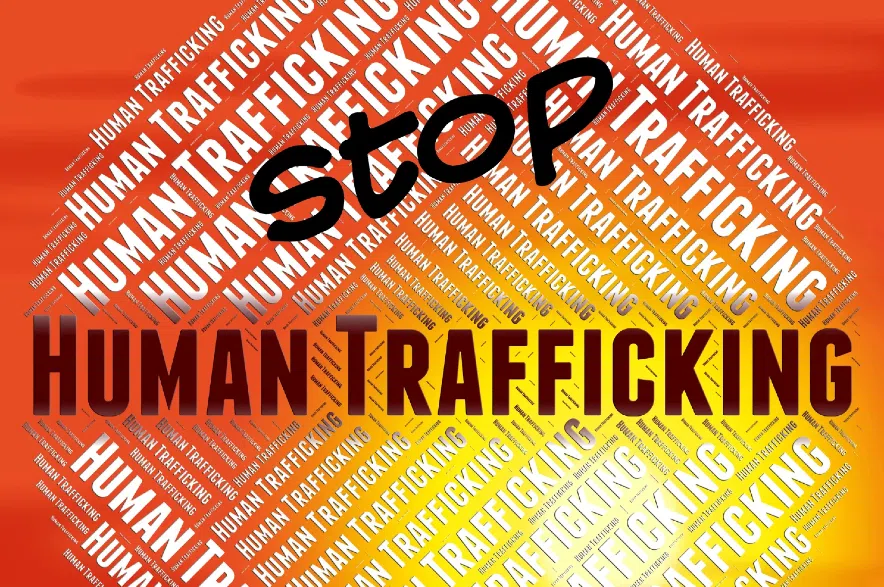Human trafficking isn’t a crime that only happens in big urban centres — it happens in cities and small communities across Saskatchewan.
In recognition of National Human Trafficking Day in Canada on Feb. 22, Saskatchewan RCMP said it’s important for everyone to recognize the signs of human trafficking and report suspected trafficking immediately.
Read more:
- Human trafficking arrest in Dundurn: RCMP
- Poster campaign looks to tackle human trafficking in Sask.
The RCMP says on its website that human trafficking is when people are recruited, kept or moved by criminals to exploit them for making money.
Victims of human trafficking can face sexual exploitation, where they are forced to provide sexual services, work in massage parlours, for escort agencies or the adult entertainment industry.
Victims can also be made to work under harsh conditions, such as long hours, low or no pay, or unsafe environments (such as in the construction industry or in agricultural work). It can also include working as caregivers with unreasonable hours and unrelated duties.
The RCMP said no one willingly chooses to be exploited and certain groups face higher risks, including migrant workers, new immigrants, youth, Indigenous people, people living in poverty, people with substance use disorders, survivors of abuse and trauma, women and girls, people who identify as 2SLGBTQ+ and people facing cultural or societal inequities.
Read more:
- Human trafficking arrest in Dundurn: RCMP
- Poster campaign looks to tackle human trafficking in Sask.
Saskatchewan RCMP’s Saskatchewan Enforcement Response Teams (SERT) and Human Trafficking and Counter Exploitation Unit (HTCEU) both target offenders and criminal groups engaged in human trafficking in the province.
RCMP said in a news release this week that HTCEU has a partnership with the Regina Police Service to provides specialized support to both RCMP detachments and municipal police agencies across the province.
“Ensuring the safety and security of the victim is always the main goal in investigations, that’s why the Saskatchewan RCMP takes a victim-centered, trauma-informed response to human trafficking,” says S/Sgt. Danny Donison, the Saskatchewan RCMP SERT south region manager and head of the HTCEU.
“Saskatchewan residents know their communities better than anyone else. Recognizing and reporting suspected trafficking is essential when it comes to holding perpetrators accountable.”

A poster in the Saskatchewan government campaign against human trafficking launched in 2024. (Saskatchewan Government/Supplied)
How to recognize and report human trafficking
Saskatchewan RCMP said anyone can be a target for human trafficking. Victims may be trafficked by someone they know, like a former or current partner, family member, friend, or trustworthy person.
They added that recruiting tactics can be subtle and often victims don’t even know they’re being trafficked.
A victim of human trafficking may display one or more of the following signs, police said:
- They don’t have access to their ID, passport or cell phone
- Are under the age of 18 and travelling with an adult who is not their parent or legal guardian
- Aren’t familiar with their surroundings or aware of what city or town they’re in
- Appear to be in a controlling or abusive relationship
- Exhibit signs of trauma, such as burns, bruises or cuts
- Show signs of malnourishment or fatigue.
Traffickers may approach potential victims by:
- Pretending to be a potential love interest, friend or support person
- Connecting over social media or in person
- Offering gifts or money
- Introducing drugs or alcohol
- Threatening potential victims’ loved ones if they don’t comply
If you suspect someone is a victim of human trafficking, call 310-RCMP or your local police.
People can also contact the Canadian Human Trafficking Hotline at 1-833-900-1010. This hotline is confidential, available 24/7 and offers services in more than 200 languages.
Information can also be submitted anonymously to Crime Stoppers at 1-800-222-8477 or at saskcrimestoppers.com.
Read more:











